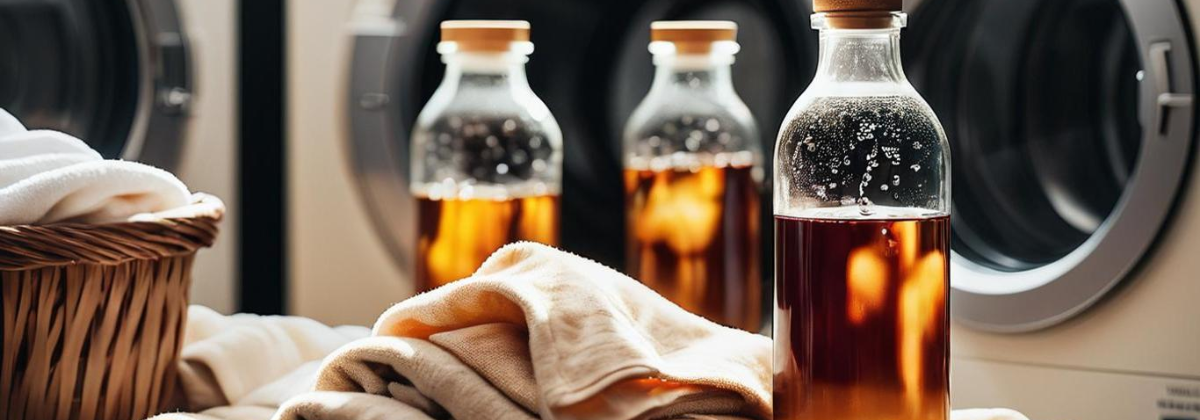07 Apr The Power of Vinegar in Laundry: Your Ultimate Guide to Laundry Success
Laundry care is essential for maintaining clean and fresh clothes. While traditional detergents play a crucial role in the process, vinegar is a natural and cost-effective solution that can enhance your laundry routine’s effectiveness. Vinegar, a pantry staple in many households, isn’t just for salad dressings or cooking; it’s also a powerful ally in the laundry room. So, let’s see how to use vinegar in laundry.
Benefits of Using Vinegar in Laundry
- Natural Fabric Softener: One of the primary benefits of vinegar in laundry is its natural fabric-softening properties. Unlike commercial fabric softeners that often contain synthetic fragrances and chemicals, vinegar provides a gentle softening effect without leaving residue behind.
- Removes Odours and Stains: Vinegar is renowned for its odour-eliminating properties, making it an excellent choice for tackling stubborn smells in laundry. Vinegar can help neutralise unpleasant smells, leaving your clothes smelling fresh and clean, whether it’s sweat, mildew, or pet odours. Vinegar can also help lift stains, especially those caused by sweat or deodorant buildup.
- Helps to Brighten Clothes: Over time, clothing can lose its brightness due to factors such as hard water deposits and detergent residue. Vinegar acts as a natural brightener, helping to restore vibrancy to dull-looking fabrics. Adding vinegar to your laundry routine can help maintain the brightness of your clothes, keeping them looking newer for longer.
- Acts as a Natural Disinfectant: In addition to its cleaning and deodorising properties, vinegar also possesses mild disinfectant properties. While it may not kill all bacteria and germs, vinegar can help inhibit their growth, making it a suitable option for sanitising laundry, especially items such as towels and bedding.
Types of Vinegar Suitable for Laundry
When it comes to using vinegar in laundry, not all types of vinegar are equal. Here are some commonly used types of vinegar that are suitable for laundry purposes:
- Distilled White Vinegar: This is the most commonly used type of vinegar for laundry. It’s clear and has a mild acidic scent that dissipates quickly.
- Apple Cider Vinegar: Known for its slightly fruity aroma, apple cider vinegar is another popular laundry detergent. It’s slightly less acidic than white vinegar and may impart a subtle scent to clothes.
- White Wine Vinegar: White wine vinegar has a slightly milder aroma than white vinegar and can also be used effectively in laundry.
How to Use Vinegar in Laundry
- Pre-soak Method: For stubborn stains or lingering odours on your clothes, pre-soaking in water and vinegar can do wonders. Fill a basin or sink with water. Then, add a cup of vinegar and soak your clothes for 30 minutes to an hour before washing them as usual. This method effectively gets rid of any hard-to-remove stains and ensures your laundry smells fresh and clean.
- Adding Vinegar During the Rinse Cycle: An effective way to improve the cleanliness and freshness of your laundry is by adding vinegar during the rinse cycle of your washing machine. You can add half a cup to a cup of vinegar either to the fabric softener dispenser or directly to the drum during the rinse cycle. This will help eliminate detergent residue, soften the fabric, and remove unpleasant odours.
- DIY Vinegar Fabric Softener: For a homemade fabric softener alternative, mix equal parts vinegar and water in a spray bottle and use it as a natural softener. Spray the solution onto your clothes before tossing them into the dryer. You can also add it to the fabric softener dispenser of your washing machine.
Precautions and Considerations
- Compatibility with Different Fabrics: While vinegar is generally safe for most fabrics, it’s essential to consider the fabric type before using vinegar in laundry. To avoid potential damage, conduct a patch test on a small, inconspicuous area of the fabric. This way, you can ensure that the vinegar does not cause any adverse reactions or discolouration.
- Potential Colour Fading: Vinegar’s acidic nature can potentially affect the colour intensity of fabrics, particularly bright or dark colours. While vinegar is unlikely to cause significant fading with normal use, prolonged exposure or excessive concentrations of vinegar may lead to gradual colour loss over time. To minimise the risk of colour fading, use vinegar sparingly and dilute it with water when necessary. Additionally, promptly rinsing garments after vinegar treatments can help prevent any lingering effects on fabric colour.
- Avoiding Vinegar with Certain Laundry Products: While vinegar is a versatile and natural cleaning agent, it’s important to exercise caution when combining it with other laundry products. Do not mix vinegar with bleach or hydrogen peroxide-based detergents. These mixtures can result in potentially harmful chemical reactions. Mixing vinegar with these products can release toxic chlorine gas, posing health risks to individuals and causing damage to fabrics. Therefore, it’s crucial to carefully read product labels and follow manufacturer recommendations to ensure safe usage.
The Last Word
Vinegar is a versatile and eco-friendly addition to your routine. Vinegar offers many benefits without harsh chemicals, from its natural fabric-softening properties to its odour-eliminating and stain-fighting capabilities. By incorporating vinegar into your laundry regimen, you can achieve cleaner, fresher-smelling clothes while reducing your environmental footprint.
However, it’s essential to exercise caution and follow proper usage guidelines. This way, you can avoid issues like fabric damage or colour fading. Conducting patch tests, diluting vinegar when necessary, and avoiding its combination with certain products are essential precautions.
With its affordability, accessibility, and effectiveness, vinegar proves to be a valuable ally in maintaining the cleanliness and longevity of your clothing. So, why not experience the natural wonders of vinegar in laundry for yourself?




Sorry, the comment form is closed at this time.